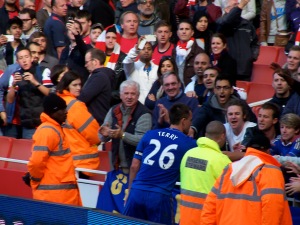In Defence of The Kick It Out Campaign
This weekend we have seen several high-profile black players refusing to wear the t-shirts of the Kick It Out Campaign, in protest at a perceived lack of action taken in tackling racism. While it is clear that not enough action has been taken by authorities to tackle racism both on and off the pitch around Europe, blaming Kick It Out is misguided and focuses on the wrong target.
First, some facts about the campaign:
- Founded in 1993 as Kick Racism Out of Football
- It employs seven staff.
- 2010-11 season, it’s operating budget was £453,913 (or just over two weeks of Rio Ferdinand‘s and John Terry’s wages)
The reason why blaming the campaign is unhelpful is that they are essentially a lobbyist and a pressure group. They raise awareness of when racism and other forms of discrimination are taking place and look to challenge it. The campaign does not have any judicial or executive power to punish either players, clubs or fans. Their remit is to educate people and increase levels of awareness about where and why discrimination is a problem.
For who is really responsible for taking action against racism in terms of punishments, then it is the FA domestically and UEFA across Europe who are responsible. In terms of the world game, ultimately it is FIFA that is responsible. These are the people who ought to be challenged on their role in tackling racism, though they are much less easy targets than a seven-person pressure group.
As Jason Roberts, one of those to boycott the awareness week t-shirts, says in an interview with the BBC, “If Danny Rose, who I think acted excellently in the whole thing, and his team-mates walk off the pitch when they first hear racist abuse, guaranteed UEFA will start to change things”. See who it is that he says needs to change things? UEFA.
Both Sir Alex Ferguson and Arsene Wenger have commented that by boycotting the Kick It Out Campaign, black players are not showing that there needs to be more action against discrimination, rather they are simply undermining the one group that is working to expose it. It is counterproductive. The strongest action would have been to wear the shirt and acknowledge that not enough has been done, and that ultimately the responsibility for punishing discrimination in football is down to the authorities.
Kick It Out and their action weeks have helped to reduce the level of discrimination at football grounds, but it is not down to just them to make the changes that need to be made. There needs to be a tough stance taken by FIFA, UEFA and the FA. John Terry could, and should, have received a more lengthy ban, as should Luis Suarez. While there were differences in the offence, a higher level of punishment, even for first time offences, would send a real message.
As for what happened in Serbia during the week, Sol Campbell is right to call on UEFA to dock points. The best way to change the culture of fans and players in the game is by pressuring them to police themselves. When English clubs were banned from European competition because of hooligans, it drove the FA, the clubs and the fans to clean it up. The same must be done with discrimination. If a fan group make racist chants, then points should be docked, matches played behind closed doors and if things still do not change, then teams banned from competitions. Using Serbia as an example, if all of their national teams were banned from their next international tournament, then it might inspire their FA to take action, and the fans to start to realise that monkey chants at black players is totally unacceptable, anywhere.
UEFA handed out €20,000 fines during Euro 2012 for racist chants by Spanish fans, but allowed them to keep the €23m prize money. If abuse happens during tournaments, then for each incident, 15% of prize money ought to be deducted and donated to organisations such as Kick It Out and FARE (Football Against Racism in Europe) – so using the figures above as an example, that would be €3.45m given to the fight against discrimination, out of the pockets of those responsible.
More support should be given by players, teams and managers to groups like Kick It Out and FARE, but it is also down to those same players, teams and fans to pressure those charged with governing football to have strong, no tolerance punishments against discrimination. These ought to be the real target, not the groups who are trying to do just that.
